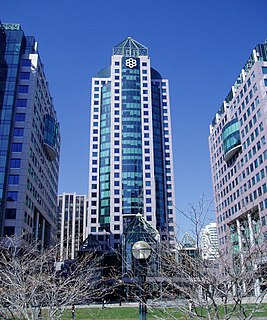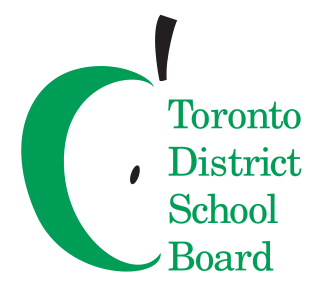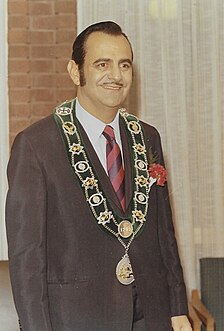| James Page Mackey | |
|---|---|
| Chief of the Metropolitan Toronto Police | |
| In office 1958–1970 | |
| Preceded by | John Chisholm |
| Succeeded by | Harold Adamson |
| Chairman of the Liquor Licensing Board of Ontario | |
| In office 1970–1975 | |
| Personal details | |
| Born | May 27, 1913 Toronto, Ontario |
| Died | February 27, 2009 (aged 95) Bracebridge, Ontario |
| Nationality | Canadian |
| Spouse(s) | Anne (Wilen) Mackey |
James Page Mackey (May 27, 1913 – February 27, 2009) was chief of the Metropolitan Toronto Police from 1958 to 1970 and the longest-serving Toronto police chief since the creation of the amalgamated police force in 1957. [1]

The Toronto Police Service is the police agency servicing Toronto, Ontario, Canada. Established in 1834, it was the first municipal police service created in North America and is one of the oldest police services in the English-speaking world. It is the largest municipal police service in Canada and third largest police force in Canada after the Ontario Provincial Police (OPP) and the Royal Canadian Mounted Police (RCMP).
A chief of police is the title given to an appointed official or an elected one in the chain of command of a police department, particularly in North America. A chief of police may also be known as a police chief or sometimes just a chief, while some countries favour other titles such as commissioner or chief constable. A police chief is appointed by and answerable to a national or local government, with the main exception being elected sheriffs in the United States.
Mackey graduated from high school in Scarborough, Ontario and thought of becoming a chemist or builder but, with work difficult to find during the Great Depression he found employment as a milkman when Toronto police sergeant Michael Byrt said to the young Mackey, "Lad, why don't you join the force? It's a good job and good jobs are hard to find these days." [2]
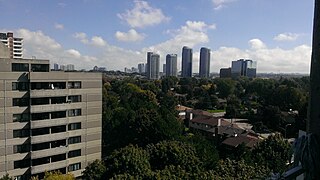
Scarborough is an administrative division in Toronto, Ontario, Canada. Situated atop the Scarborough Bluffs, it occupies the eastern part of the city. Scarborough is contained within the borders of Victoria Park Avenue on the west, Steeles Avenue to the north, Rouge River and the city of Pickering to the east, and Lake Ontario to the south. It borders Old Toronto, East York and North York in the west and the city of Markham in the north. Scarborough was named after the English town of Scarborough, North Yorkshire.
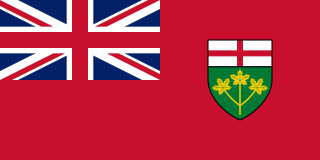
Ontario is one of the 13 provinces and territories of Canada and is located in east-central Canada. It is Canada's most populous province accounting for 38.3 percent of the country's population, and is the second-largest province in total area. Ontario is fourth-largest jurisdiction in total area when the territories of the Northwest Territories and Nunavut are included. It is home to the nation's capital city, Ottawa, and the nation's most populous city, Toronto, which is also Ontario's provincial capital.

The Great Depression was a severe worldwide economic depression that took place mostly during the 1930s, beginning in the United States. The timing of the Great Depression varied across nations; in most countries it started in 1929 and lasted until the late-1930s. It was the longest, deepest, and most widespread depression of the 20th century. In the 21st century, the Great Depression is commonly used as an example of how intensely the world's economy can decline.
Mackey joined the original Toronto Police Department in 1936, "Jim was the 20th of 20 men taken on," his wife, Anne, later recalled. "We were very happy." [2]
He went on a leave of absence during World War II to serve in the Royal Canadian Air Force and returned to the department after the war. [1] He walked the beat, then became a detective [2] and rose to the rank of junior inspector when, in 1958, he skipped two ranks to be appointed to be chief of police of the newly created Metropolitan Toronto Police following the suicide of Chief John Chisholm. The newly expanded department of 2,300 officers and civilians [2] had been created the year before due to the amalgamation of the original Toronto Police Department with twelve suburban police departments. [1]

World War II, also known as the Second World War, was a global war that lasted from 1939 to 1945. The vast majority of the world's countries—including all the great powers—eventually formed two opposing military alliances: the Allies and the Axis. A state of total war emerged, directly involving more than 100 million people from over 30 countries. The major participants threw their entire economic, industrial, and scientific capabilities behind the war effort, blurring the distinction between civilian and military resources. World War II was the deadliest conflict in human history, marked by 50 to 85 million fatalities, most of whom were civilians in the Soviet Union and China. It included massacres, the genocide of the Holocaust, strategic bombing, premeditated death from starvation and disease, and the only use of nuclear weapons in war.

The Royal Canadian Air Force is the air force of Canada. Its role is to "provide the Canadian Forces with relevant, responsive and effective airpower". The RCAF is one of three environmental commands within the unified Canadian Armed Forces. As of 2013, the Royal Canadian Air Force consists of 14,500 Regular Force and 2,600 Primary Reserve personnel, supported by 2,500 civilians, and operates 258 manned aircraft and 9 unmanned aerial vehicles. Lieutenant-General Al Meinzinger is the current Commander of the Royal Canadian Air Force and Chief of the Air Force Staff.

Suicide is the act of intentionally causing one's own death. Mental disorders, including depression, bipolar disorder, schizophrenia, personality disorders, and substance abuse—including alcoholism and the use of benzodiazepines—are risk factors. Some suicides are impulsive acts due to stress, such as from financial difficulties, troubles with relationships, or bullying. Those who have previously attempted suicide are at a higher risk for future attempts. Effective suicide prevention efforts include limiting access to methods of suicide—such as firearms, drugs, and poisons; treating mental disorders and substance misuse; proper media reporting of suicide; and improving economic conditions. Even though crisis hotlines are common, there is little evidence for their effectiveness.
In the 1960s, he was successful in stopping mobsters from Buffalo, New York from establishing a foothold in Toronto. [2]

Buffalo is the second largest city in the U.S. state of New York and the largest city in Western New York. As of 2017, the population was 258,612. The city is the county seat of Erie County and a major gateway for commerce and travel across the Canada–United States border, forming part of the bi-national Buffalo Niagara Region.
He served as chief for 12 years before retiring in 1970. He was then Chairman of the Liquor Licensing Board of Ontario until 1975. [2] His autobiography, I Policed Toronto, was published in 1985. [1]
Mackey retired to Bracebridge, Ontario where he died at the age of 95. [1]
